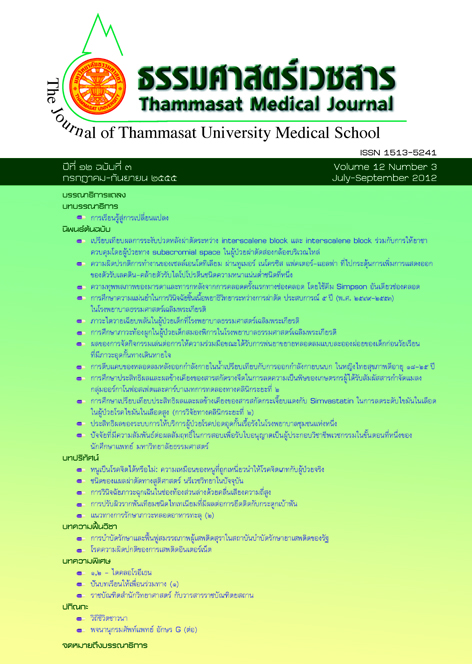The Effectiveness of a Service System for Chronic Obstructive Pulmonary Disease in Community Hospital
Keywords:
อัตราการเกิดอาการหอบกำเริบ, ค่าสมรรภาพปอด, คุณภาพชีวิต, Exacerbation, Re-admission record, Peak expiratory flow rate (PEFR), Quality of life (QOL)Abstract
The aim of this quasi-experimental study was to investigate the effectiveness of a service system for Chronic Obstructive Pulmonary disease (COPD) in a community hospital. The thirty -eight COPD patients were diagnosed by testing. They had mild to severe severity level by COLD definition and came for physical check up at out-patient department, Kuraburi hospital Phang-nga Province during January 2011 – May 2011. This study was one group pretest–posttest design. The subjects received a service system which developed by researcher and based on the principal of easy COPD clinic and concepts of home health care. Exacerbation, re-admission record, peak expiratory fl ow rate (PEFR) and quality of life (QOL) were collected.
Findings indicated that 3 months after receiving a service system for patients with COPD in a community hospital, exacerbation rate of the patients had decreased from 0.81 time/person/month to 0.51 time/person/month. Moreover, there was only one patient who had 4 times readmission before entering the program and then decreasedto 1 time after participating in the program. The patients also had signifi cantly increased peak expiratory fl ow rate (p <.001) and quality of life score (p < .001) after participating in the program.
Result from this study offered a new insight into the process of providing a service system for patients with COPD in a community hospital level. The service system should be further studied in long term with having comparison group in order to test the effectiveness of the service system.
Key words: Exacerbation, Re-admission record, Peak expiratory fl ow rate (PEFR), Quality of life (QOL)



